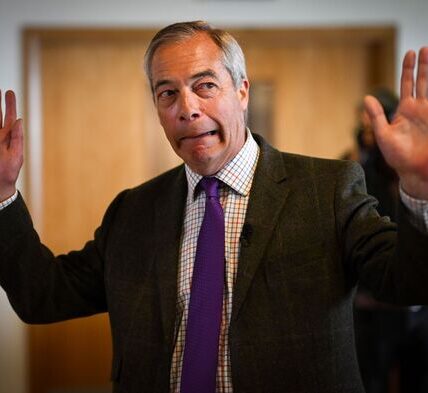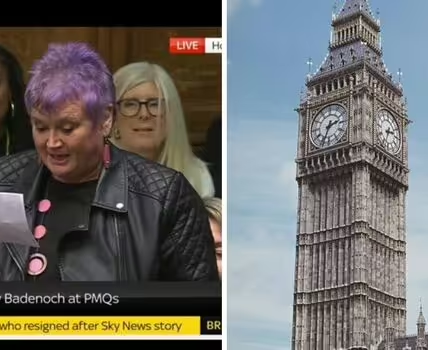The under-pressure Chancellor is poised to raise taxes next month as she desperately tries to dig herself out of a major black hole
Rachel Reeves faced fresh humiliation after Britain’s growth prospects were downgraded and unemployment soared to a four year high. Critics accused the Chancellor of “killing growth and crushing jobs” as the International Monetary Fund cut its forecast for UK growth next year.
Kemi Badenoch said Labour’s economic failures are “making all of our lives much harder”. The Tory leader added that neither Ms Reeves or Keir Starmer have the “backbone to do what’s needed”.
Her stark assessment came as the IMF also warned that prices here are rising even faster than in some developing economies, such as Peru and Senegal.
Britain is now expected to see the highest inflation in the G7 over the next two years, whittling away any growth in household incomes.
It is a major blow to Sir Keir’s pledge to raise living standards in the UK.
Meanwhile, unemployment hit a four-year high and wage growth slowed.
The Chancellor will today (Wed) urge top global firms to invest in the UK at a Washington meeting of the IMF, where she will highlight her commitment to “economic stability”.
But new figures showed the jobless rate increased unexpectedly to 4.8% in the three months to August, up from 4.7%, to reach the highest rate since March 2021.
There are now 1.74 million people unemployed, up from 1.44 million 12 months previously.
Wage growth fell back to 4.7% in the three months to August, down from 4.8% in the previous three months. This is a real terms increase of 0.9% once inflation is taken into account.
Shadow Chancellor, Sir Mel Stride said: “Since taking office, Labour have allowed the cost of living to rise, debt to balloon, and business confidence to collapse to record lows. Taxes are rising to record highs and families are being squeezed from all sides.
“Working people are feeling the impact every time they shop, fill up the car, or pay their mortgage.”
Helen Whately, Shadow Work and Pensions Secretary, said: “In just over a year, Labour has killed growth and crushed jobs and livelihoods, with families paying the price.”
While in Washington, the Chancellor will meet business leaders from top US firms and highlight the Government’s efforts to support major infrastructure projects by slashing red tape.

Kemi Badenoch (Image: Getty)
Ministers have introduced amendments to the Government’s Planning and Infrastructure Bill to cut by six months the time projects can be held up by legal objections.
Lengthy judicial reviews have left over 30 infrastructure projects like the Norfolk Offshore Windfarm and A38 Derby junction improvements in limbo for years, Ministers say.
But the changes are designed to stop local councils and protestors blocking schemes such as roads, reservoirs, airports, and railways.
Experts said jobs figures showed the increase in National Insurance imposed in last year’s Budget and Labour’s new employment rights laws were hurting the economy.
Len Shackleton, Research Fellow at free market think tank the Institute of Economic Affairs, said: “Employers are extremely wary of taking on untried labour market entrants.”
But Secretary of State for Work and Pensions, Pat McFadden said: “The numbers of people in work and looking for work are at a record high.”
Fears are mounting that the Chancellor will use her Budget on November 26 to hike taxes to dig herself out of a major black hole.
She is also facing fresh demands to increase the lowest tax threshold to prevent millions of pensioners being hit by a punishing stealth raid.
Campaigners have warned that more than four million OAPs could pay tax on their state pension for the first time in 2027 unless the Chancellor takes action.
The state pension is now likely to rise by around 4.8% next April after wage figures were revised upwards yesterday (Tue).
But the increase means millions will be dragged over the £12,570 income level at which pensioners would start to pay tax the following year.
Former pensions minister Sir Steve Webb, a partner at consultants Lane Clark & Peacock, said it’s almost inevitable that many pensioners will be forced into paying tax unless changes are made.
“We can now be pretty certain that the new state pension and the basic state pension will rise by 4.8%,” he said.
“This will keep the headline rate of the state pension below the income tax threshold for one more year, but it will go above the tax threshold in 2027 if allowances do not rise”.
Dennis Reed, director of the Silver Voices campaign group for the over-60s, accused the Chancellor of trying to undermine the pensions triple lock.
“This situation is now urgent and the Chancellor can no longer duck and dive.
“If she continues to do nothing on the lower tax threshold the basic state pension will be taxed by default and millions of pensioners will have their modest incomes cut.
“I am concerned that this is a conscious plan to means-test the state pension by stealth and undermine the triple lock by the back door.”
Both the Tories and Labour have said they are committed to the triple lock while Nigel Farage says he hasn’t decided yet whether Reform UK will.
Under the triple lock policy, the state pension goes up each year by either inflation, 2.5% or average earnings growth – whichever is the highest figure.
New figures from the Office for National Statistics (ONS) yesterday (Tue) revised estimates of the growth in average earnings in the year to May-July 2025 from 4.7% to 4.8%.
This means the annual rate of the new state pension – which is for those who reached pension age after April 2016 – is around £10 higher than if the increase had been based on last month’s reading.

